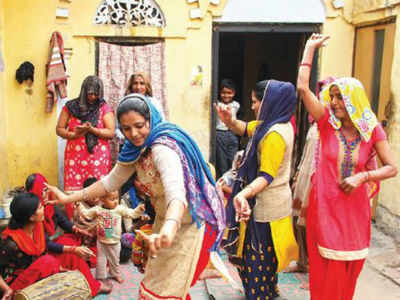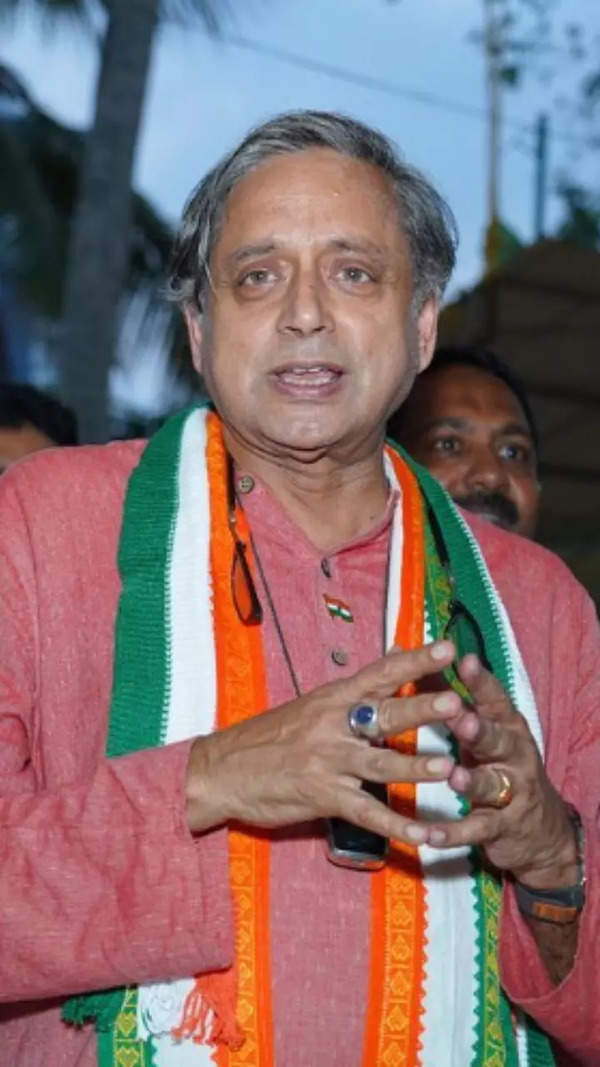- News
- entertainment
- english
- hollywood
- Oscar win puts little-known Hapur village on world map
Trending
This story is from February 26, 2019
Oscar win puts little-known Hapur village on world map

Residents of Kathikeda celebrate the Oscar awarded to ‘Period. End of Sentence’ in the short documentary category
KATHIKEDA (HAPUR): Tucked away in a corner of Hapur district, some 120km from Delhi, Kathikeda was an obscure village — till Monday. As news spread about the film ‘Period. End of Sentence’ winning an Oscar for best documentary, people from adjacent villages began arriving to celebrate.
The movie has been filmed on the sanitary pad-making unit here. Ironically, when the unit was set up in 2017, it had led to negative comments from villagers.Some made fun of the people employed here while others said the work was ‘dirty’.
“I dropped out of school after Class IX due to lack of funds. I always wanted to complete my education and become a singer. However, I could not contribute to the family’s income. Then the unit was started. At first, I told my family that I used to make diapers for kids; I told them the truth much later. They eventually allowed me to continue working, although they protested at first. I get Rs 2,500 a month now and I am saving the money to complete my education and fulfil my dream of becoming a singer,” said 18-year-old Ruksana.
She is among the several whose dreams have got wings thanks to ‘Fly’ sanitary napkins made here. Currently a workplace for seven women, the unit operates from the house of Suman, who was in Los Angeles for the Oscar ceremony on Monday, along with the movie’s star Sneha.
Rakhi, the manager of the pad-making unit, said, “Earlier girls used to drop out of school once their periods started because it became embarrassing for them when their clothes got stained. I was so shy that I couldn’t even tell my father that I worked at a pad-making unit and my mother had to tell this to him. But now, menstruation is no more a taboo in the village. People talk about it and don’t make fun anymore.” She has completed her BA and plans to become a teacher after completing her postgraduate degree. The other women working here include Sushma, 32, Preeti, 20, Neeshu, 18, and Arshi, 18, – apart from Sneha and Suman who were in Los Angeles on Monday.
The villagers were shown the movie on a projector by the filmmakers some months back. Not many had realised that the movie would make such waves worldwide. “When we used to talk about menstruation or sanitary napkins, people would abuse us and call us ‘bad women’. But gradually other women started listening to us and that is when change started happening. Moreover, when the movie was shot and interviews taken even from the men of the village, people opened up about the issue. Now, we do not have to be conscious while talking about it anymore,” said Shabana Khan, area coordinator (Hapur), Action India NGO.
Now, another pad-making unit has been set up in Sudhna village of Hapur. The unit was set up after funds were raised by English teacher Melissa Berton and 10 girl students from a school in Los Angeles to donate a pad-making machine in collaboration with NGOs Girls Learn International and Action India.
While Suman – at whose house the pad-making unit was set up – has been working with the NGO since 2010 and was instrumental in spreading awareness, Sneha works at the unit to save money for her coaching so that she can become a police officer one day. Rajendra Tawar, Sneha’s father, said, “Sneha has always wanted to be independent and working at the unit makes her so. On a normal day, she would have not left Hapur alone, but she attended the Oscars in Los Angeles and that’s close to her dream of being an independent woman.”
With the movie winning an Oscar, the village has become world-famous, said Poonam, Sneha’s cousin. “Earlier the relatives of my in-laws used to ask where exactly was Kathikeda located. Looks like now we can pick up any newspaper and show them on page 1,” she said.
The movie has been filmed on the sanitary pad-making unit here. Ironically, when the unit was set up in 2017, it had led to negative comments from villagers.Some made fun of the people employed here while others said the work was ‘dirty’.
“I dropped out of school after Class IX due to lack of funds. I always wanted to complete my education and become a singer. However, I could not contribute to the family’s income. Then the unit was started. At first, I told my family that I used to make diapers for kids; I told them the truth much later. They eventually allowed me to continue working, although they protested at first. I get Rs 2,500 a month now and I am saving the money to complete my education and fulfil my dream of becoming a singer,” said 18-year-old Ruksana.
She is among the several whose dreams have got wings thanks to ‘Fly’ sanitary napkins made here. Currently a workplace for seven women, the unit operates from the house of Suman, who was in Los Angeles for the Oscar ceremony on Monday, along with the movie’s star Sneha.
Things have changed in the village of Kathikeda, in Hapur district,– for the better – after a sanitary pad-making unit was set up and the movie ‘Period. End of Sentence’ was filmed. The village women, who did not know about sanitary napkins and used cloth during their periods, now use pads. Others couldn’t use them because pads were not readily available in the village. However, the women now distribute these from door to door. The pads are also made available at shops, priced at Rs 20 for a packet of six. Each woman at the unit is paid Rs 2,500 – which was Rs 2,000 till last month, and was increased only after their movie got nominated for the Oscars.
Rakhi, the manager of the pad-making unit, said, “Earlier girls used to drop out of school once their periods started because it became embarrassing for them when their clothes got stained. I was so shy that I couldn’t even tell my father that I worked at a pad-making unit and my mother had to tell this to him. But now, menstruation is no more a taboo in the village. People talk about it and don’t make fun anymore.” She has completed her BA and plans to become a teacher after completing her postgraduate degree. The other women working here include Sushma, 32, Preeti, 20, Neeshu, 18, and Arshi, 18, – apart from Sneha and Suman who were in Los Angeles on Monday.
The villagers were shown the movie on a projector by the filmmakers some months back. Not many had realised that the movie would make such waves worldwide. “When we used to talk about menstruation or sanitary napkins, people would abuse us and call us ‘bad women’. But gradually other women started listening to us and that is when change started happening. Moreover, when the movie was shot and interviews taken even from the men of the village, people opened up about the issue. Now, we do not have to be conscious while talking about it anymore,” said Shabana Khan, area coordinator (Hapur), Action India NGO.
Now, another pad-making unit has been set up in Sudhna village of Hapur. The unit was set up after funds were raised by English teacher Melissa Berton and 10 girl students from a school in Los Angeles to donate a pad-making machine in collaboration with NGOs Girls Learn International and Action India.
While Suman – at whose house the pad-making unit was set up – has been working with the NGO since 2010 and was instrumental in spreading awareness, Sneha works at the unit to save money for her coaching so that she can become a police officer one day. Rajendra Tawar, Sneha’s father, said, “Sneha has always wanted to be independent and working at the unit makes her so. On a normal day, she would have not left Hapur alone, but she attended the Oscars in Los Angeles and that’s close to her dream of being an independent woman.”
With the movie winning an Oscar, the village has become world-famous, said Poonam, Sneha’s cousin. “Earlier the relatives of my in-laws used to ask where exactly was Kathikeda located. Looks like now we can pick up any newspaper and show them on page 1,” she said.
End of Article
FOLLOW US ON SOCIAL MEDIA









